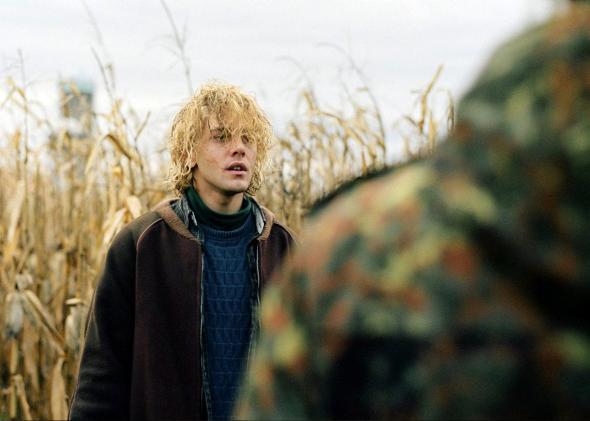Québécois filmmaker Xavier Dolan is only 26 years old, but the enfant terrible of Canadian cinema already has five celebrated features under his belt. His latest, a creepy adaptation of Michel Marc Bouchard’s 2011 play Tom at the Farm, is Dolan’s extended shout-out to the Master of Suspense. Dolan employs many of Hitch’s favorite tropes—mommy issues, the everyman placed in strange situations, frightening shower scenes, the Hitchcock blonde—to assemble a coiled, naughty Hitchcockian thriller with a modern twist: Dolan himself plays the signature Hitchcock blonde, albeit with a ratty bleach job.
Tom at the Farm opens with Tom (Dolan) driving from Montreal to the country for the funeral of his boyfriend, Guillaume. Upon arrival, he finds out that no one knows about him or his relationship with Guillaume and that the rest of the unnamed small town keeps a safe distance from Guillaume’s family. Guillaume’s mother, Agathe (Lise Roy), meanwhile, obsesses over the fact that the girlfriend Guillaume fabricated to appease his mother has not come for her son’s funeral. And Guillaume’s brute of a brother, Francis (Pierre-Yves Cardinal), draws Tom into a sexually charged game that’s part schoolyard bullying and part straight-up domestic violence.
City-slicker Tom turns out to be well-suited to farm life, milking cows, delivering calves, and spraying down cattle pens. And he grows closer to the mercurial Francis, who becomes a surrogate for Guillaume; Tom finds his tormentor smells and sounds exactly like his dead lover, making it even harder to head back home to the city. Despite Francis’ violent tendencies and homophobia, he seems to invite this attraction, particularly in a hysterical cocaine-fueled tango with Tom in an empty barn. Tom soon develops full-fledged Stockholm syndrome, embracing his role as part of the deeply disturbed household and participating in its attendant psychoses and delusions. Before long, Tom requests Francis’ rough touch in a twisted moment of erotic asphyxiation.
With this movie, Dolan himself took a trip to the farm, in a way, by breaking from his usual focus on city life and the colorful urbanites of his native Montreal. Since his first movie, I Killed My Mother (made when he was just 20), Dolan’s works have been lyrical, exuberant, and full of unrequited love. Characters scream and storm off, or sashay in slow-motion to plaintive throwback ballads. His actors have expressive faces, often shown in close-up, that can be savored for hours. (Including Dolan’s own—critics have accused him of being narcissistic, lingering over his own face for too much of Tom at the Farm.)
But the movie is also a stylistic departure from the rest of Dolan’s oeuvre, heading north by northwest to the psychosexual terrain of Psycho and Vertigo. In lieu of pop songs, we have Gabriel Yared’s jittery string arrangements that immediately conjure Bernard Herrmann’s legendary scores for Hitchcock. Instead of extravagantly costumed fashionistas, we have the practical, comfortable attire of small-towners. And while much was made of Dolan’s use of a square frame in his last film, Mommy, and the old-fashioned 4:3 in Laurence Anyways, he also toys with aspect ratios in Tom at the Farm, but in a subtler and arguably more effective way. In the midst of one especially suspenseful scene, he uses the darkness of the environs to imperceptibly and gradually condense the frame to a tight 2.35:1, freighting the moment with tension. Then, as the anxiety dissipates a few minutes later, he reverts to the original frame, the black bars rolling back like a sigh of relief.
Although Dolan has called it by far his most accessible film, Tom at the Farm is hardly paint-by-numbers. Rather, the movie finds Dolan experimenting to reinvigorate the tired psychological thriller genre, with assists from Yared and cinematographer André Turpin—not to mention a certain master of suspense. When Hitchcock was once told that Brian De Palma intended the dutiful Dressed to Kill as an homage to his movies, the auteur reportedly responded, “You mean fromage.” Tom at the Farm shows how to do Hitchcock justice by embracing his spirit of stylistic adventurousness. It’s Hitchcock without the cheese.
